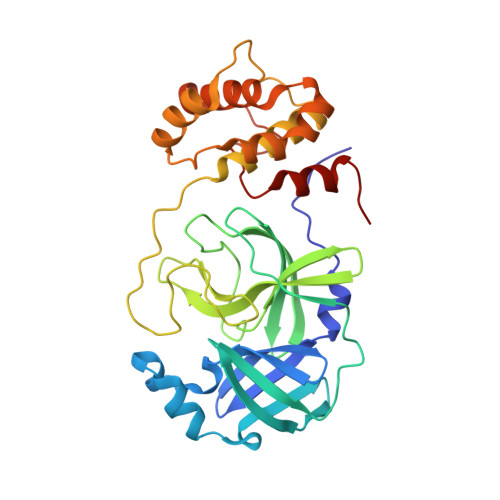Structure and inhibition of SARS-CoV-1 and SARS-CoV-2 main proteases by oral antiviral compound AG7404.
Fabrega-Ferrer, M., Herrera-Morande, A., Muriel-Goni, S., Perez-Saavedra, J., Bueno, P., Castro, V., Garaigorta, U., Gastaminza, P., Coll, M.(2022) Antiviral Res 208: 105458-105458
- PubMed: 36336176
- DOI: https://doi.org/10.1016/j.antiviral.2022.105458
- Primary Citation of Related Structures:
7P35, 7ZQV, 7ZQW - PubMed Abstract:
Severe acute respiratory syndrome coronaviruses 1 and 2 (SARS-CoV-1 and SARS-CoV-2) pose a threat to global public health. The 3C-like main protease (M pro ), which presents structural similarity with the active site domain of enterovirus 3C protease, is one of the best-characterized drug targets of these viruses. Here we studied the antiviral activity of the orally bioavailable enterovirus protease inhibitor AG7404 against SARS-CoV-1 and SARS-CoV-2 from a structural, biochemical, and cellular perspective, comparing it with the related molecule rupintrivir (AG7800). Crystallographic structures of AG7404 in complex with SARS-CoV-1 M pro and SARS-CoV-2 M pro and of rupintrivir in complex with SARS-CoV-2 M pro were solved, revealing that all protein residues interacting with the inhibitors are conserved between the two proteins. A detailed analysis of protein-inhibitor interactions indicates that AG7404 has a better fit to the active site of the target protease than rupintrivir. This observation was further confirmed by biochemical FRET assays showing IC 50 values of 47 μM and 101 μM for AG7404 and rupintrivir, respectively, in the case of SARS-CoV-2 M pro . Equivalent IC 50 values for SARS-CoV-1 also revealed greater inhibitory capacity of AG7404, with a value of 29 μM vs. 66 μM for rupintrivir. Finally, the antiviral activity of the two inhibitors against SARS-CoV-2 was confirmed in a human cell culture model of SARS-CoV-2 infection, although rupintrivir showed a higher potency and selectivity index in this assay.
- Institute for Research in Biomedicine (IRB Barcelona), The Barcelona Institute of Science and Technology, Baldiri Reixac 10, 08028, Barcelona, Spain; Institut de Biologia Molecular de Barcelona (IBMB-CSIC), Baldiri Reixac 10, Barcelona, 08028, Spain.
Organizational Affiliation:

















